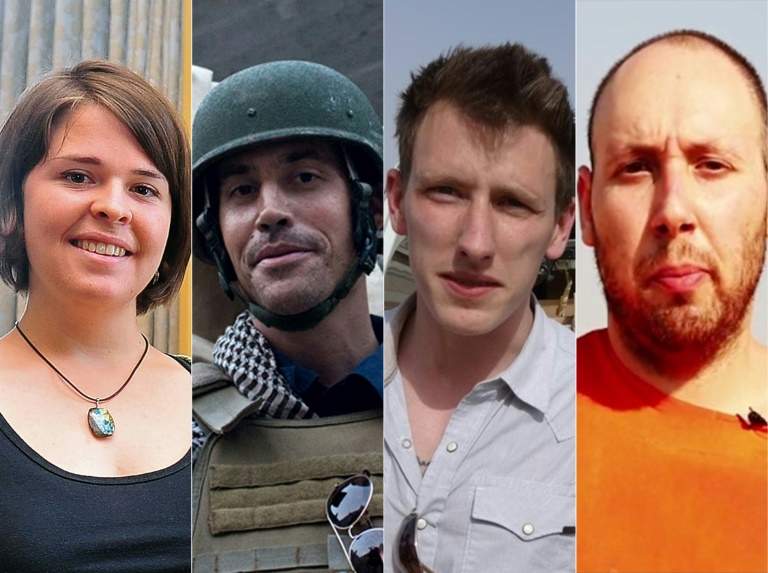
ALEXANDRIA (UNITED STATES) - El Shafee Elsheikh, a member of the notorious Islamic State kidnap-and-murder cell known as the "Beatles," was found guilty of all charges on Thursday for the deaths of four American hostages in Syria.
A jury convicted Elsheikh, 33, a former British national, of all eight counts after a two-week trial, the most significant prosecution of an IS member in the United States.
Elsheikh was charged with hostage-taking, conspiracy to murder US citizens -- journalists James Foley and Steven Sotloff and aid workers Peter Kassig and Kayla Mueller -- and supporting a terrorist organization.
"This is a day that we didn't need bombs or bullets to bring justice," said James Foley's mother Diane, who fought tirelessly to try to secure her son's release. "I really feel that justice prevailed."
Kayla Mueller's father also welcomed the sweeping guilty verdicts.
"We all saw the American justice system do what it does best," said Carl Mueller, who along with his wife, Marsha, attended the grueling trial in US District Court in Alexandria near the capital Washington.
The 12-person jury deliberated for a total of around six hours over two days before delivering the verdict.
Elsheikh did not display any visible reaction as the guilty findings were read but several members of the families of the slain American hostages who were in the public gallery dabbed at their eyes.
Elsheikh and another former "Beatle," Alexanda Amon Kotey, 38, were captured by a Kurdish militia in Syria in January 2018 and handed over to US forces in Iraq.
They were flown to the United States in 2020 to face trial. Kotey pleaded guilty in September 2021 and is facing life in prison.
Elsheikh, who was stripped of his citizenship by Britain, also faces a potential life sentence.
"The sentence he's going to get is probably worse than a death sentence," Carl Mueller said.
- 'Loathsome' -
Elsheikh's defense attorney, Nina Ginsberg, had argued that while Elsheikh may indeed have been an IS fighter, prosecutors had not proved he actually was a "Beatle."
Ginsberg said the "Beatles" were responsible for "brutal" and "loathsome" acts but insisted Elsheikh was not one of them.
Besides the deaths of the American hostages, Elsheikh and the other "Beatles" are suspected of involvement in the kidnapping in Syria of some 20 other journalists and relief workers from Europe, Russia and Japan.
During the trial, prosecutors played media interviews for the jury during which Elsheikh acknowledged having interactions with some of the hostages.
In the interviews conducted after his capture in Syria, Elsheikh admitted taking email addresses and proof of life questions from the hostages and to even physically beating them.
Ginsberg said Elsheikh was a "broken man" at that time and only made the admissions to avoid being sent to Iraq, where he would have faced a summary trial and execution.
He wanted to be sent to Britain or the United States "where he could get a fair trial," she said.
- 'Brutal legacy' -
Nicolas Henin, a former French hostage who testified at the trial to his harrowing treatment in captivity, said following the verdict that he was "grateful to the American justice system for having organized this trial."
"A terrorist crime opens a gaping wound in a society," Henin said. "Only justice can bring closure to such a monstrous chapter."
"It does not bring back the dead, it does not heal all the pain, but it soothes," he said.
Foley, Sotloff and Kassig were beheaded by "Beatle" Mohamed Emwazi, known as "Jihadi John," and videos of their deaths were released by IS for propaganda purposes.
Mueller was initially held by the "Beatles" but then was turned over to IS leader Abu Bakr al-Baghdadi, who reportedly raped her repeatedly.
IS announced Mueller's death in February 2015 and said she was killed in a Jordanian airstrike, a claim that was disputed by US authorities.
Baghdadi died during a US special forces raid in 2019. Emwazi was killed by a US drone in Syria in 2015.
In his closing argument, prosecutor Raj Parekh told the jury the government had proved that Elsheikh, Kotey and Emwazi "grew up together, radicalized together, fought as high-ranking IS fighters together and tortured and terrorized hostages together."
"What these horrific crimes left behind is a legacy of brutal killings and shattered families," Parekh said.